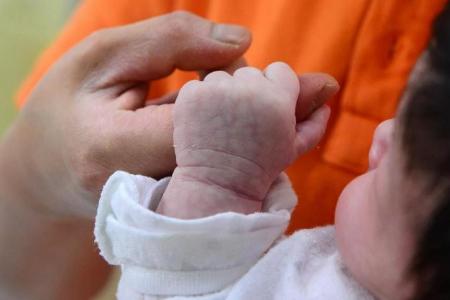Despite S. Korea’s low birth rate, babies are still being sent overseas for adoption
SEOUL – Born as Yoon-hwa in South Korea in 1974, she became Petra Zwart of the Netherlands at the age of one.
Her adoptive Dutch family provided a warm and welcoming home to both Ms Zwart and her biological brother, who was adopted at the age of five.
Even so, Ms Zwart recalls finding it difficult to fit in as a child, due to her East Asian appearance being different, “like an ugly duckling”.
She and her brother are among the nearly 170,000 babies that South Korea has sent overseas for adoption since 1953.
Despite much criticism of transnational adoption from Korea, it has not stopped. In 2022, some 142 Korean babies were sent abroad.
Upon hearing the latest adoption figures, Ms Zwart could not help but ask: “Why is this still happening?
“Now that South Korea has become a prosperous country, and we all know a lot more about the consequences of transracial adoption, knowing it is not always in the best interest of the child, isn’t it time to take another approach?”
South Korea, according to one study, ranked fifth globally in terms of the number of children sent abroad for international adoption in 2021.
The history of the country’s international adoptions traces back to 1953 when an estimated 100,000 children were orphaned and homeless in the wake of the Korean War. In exceptional circumstances like that, or in the case of a major disaster, it is not uncommon for a large number of overseas adoptions to occur in a short period of time.
However, overseas adoption did not subside in South Korea after stability returned. On the contrary, adoptions boomed in the following decades. At its peak in 1985, 8,837 babies were sent overseas, equivalent to 1.35 per cent of babies born in the country that year.
Even today, although the figures are not as high as before, the country still gives up a large number of its children for international adoption. In 2022, 142 babies were sent away for adoption, down from 755 babies in 2012.
According to a study by Dr Peter Selman from Newcastle University in the UK, between 2004 and 2021, South Korea was among the top seven nations that placed children up for transnational adoption, with 16,051 children sent away over that period. In 2021, it ranked fifth, after Colombia, India, Ukraine and Thailand.
Of all children who were given new homes through adoption, international match-ups accounted for some 40 per cent to 44 per cent, with the share remaining more or less stable despite the overall decline in total adoptions worldwide.
Experts assert that while there are clear incentives for private adoption agencies to arrange international adoptions, the government has been inactive about improving child welfare and the broader social situation that leads to babies being given up for adoption.
They say that this reality has resulted in the bitter irony of South Korea continuing to send babies abroad despite its cripplingly low birth rate.
Four agencies handle international adoptions: Holt Children’s Services, the Korea Social Service, Korea Welfare Services and the Eastern Social Welfare Society.
Between 2018 and 2022, the four agencies sent a combined 1,183 children overseas and received a total of 22.1 billion won ($22.2 million) in commission fees, according to the office of Representative Choi Yeon-sook from the People Power Party, citing information from the Welfare Ministry. On average, the fees received by agencies amounted to 18.7 million won per child.
Those fees were on top of the 2.7 million won the agencies received from the government for each adoption arranged. This amount is the same for domestic and international cases.
Soongsil University social welfare professor Noh Hye-ryun, who worked at Holt in 1981, said overseas adoptions are clearly preferred by South Korea’s agencies.
“Compared with domestic adoption, overseas adoption brings in over 10 times the money with much less work. Adoption agencies also don’t have to deal with post-adoption matters because the children are taken care of by cooperating agencies in the country where they are adopted,” said Professor Noh, adding that with the lack of government oversight, the four adoption agencies had been allowed to profit from baby brokering.
“Korean babies, who were healthy and young, were sent overseas at the highest prices,” she said, citing her own analysis of the agencies’ adoption paperwork in April 2023. – THE KOREA HERALD/ASIA NEWS NETWORK
Get The New Paper on your phone with the free TNP app. Download from the Apple App Store or Google Play Store now


